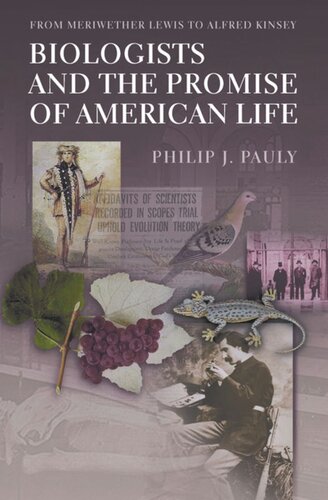

Most ebook files are in PDF format, so you can easily read them using various software such as Foxit Reader or directly on the Google Chrome browser.
Some ebook files are released by publishers in other formats such as .awz, .mobi, .epub, .fb2, etc. You may need to install specific software to read these formats on mobile/PC, such as Calibre.
Please read the tutorial at this link: https://ebookbell.com/faq
We offer FREE conversion to the popular formats you request; however, this may take some time. Therefore, right after payment, please email us, and we will try to provide the service as quickly as possible.
For some exceptional file formats or broken links (if any), please refrain from opening any disputes. Instead, email us first, and we will try to assist within a maximum of 6 hours.
EbookBell Team

0.0
0 reviewsExplorers, evolutionists, eugenicists, sexologists, and high school biology teachers--all have contributed to the prominence of the biological sciences in American life. In this book, Philip Pauly weaves their stories together into a fascinating history of biology in America over the last two hundred years.
Beginning with the return of the Lewis and Clark expedition in 1806, botanists and zoologists identified science with national culture, linking their work to continental imperialism and the creation of an industrial republic. Pauly examines this nineteenth-century movement in local scientific communities with national reach: the partnership of Asa Gray and Louis Agassiz at Harvard University, the excitement of work at the Smithsonian Institution and the Geological Survey, and disputes at the Agriculture Department over the continent's future. He then describes the establishment of biology as an academic discipline in the late nineteenth century, and the retreat of life scientists from the problems of American nature. The early twentieth century, however, witnessed a new burst of public-oriented activity among biologists. Here Pauly chronicles such topics as the introduction of biology into high school curricula, the efforts of eugenicists to alter the "breeding" of Americans, and the influence of sexual biology on Americans' most private lives.
Throughout much of American history, Pauly argues, life scientists linked their study of nature with a desire to culture--to use intelligence and craft to improve American plants, animals, and humans. They often disagreed and frequently overreached, but they sought to build a nation whose people would be prosperous, humane, secular, and liberal. Life scientists were significant participants in efforts to realize what Progressive Era oracle Herbert Croly called "the promise of American life." Pauly tells their story in its entirety and explains why now, in a society that is rapidly returning to a complex ethnic mix similar to the one that existed for a hundred years prior to the Cold War, it is important to reconnect with the progressive creators of American secular culture.